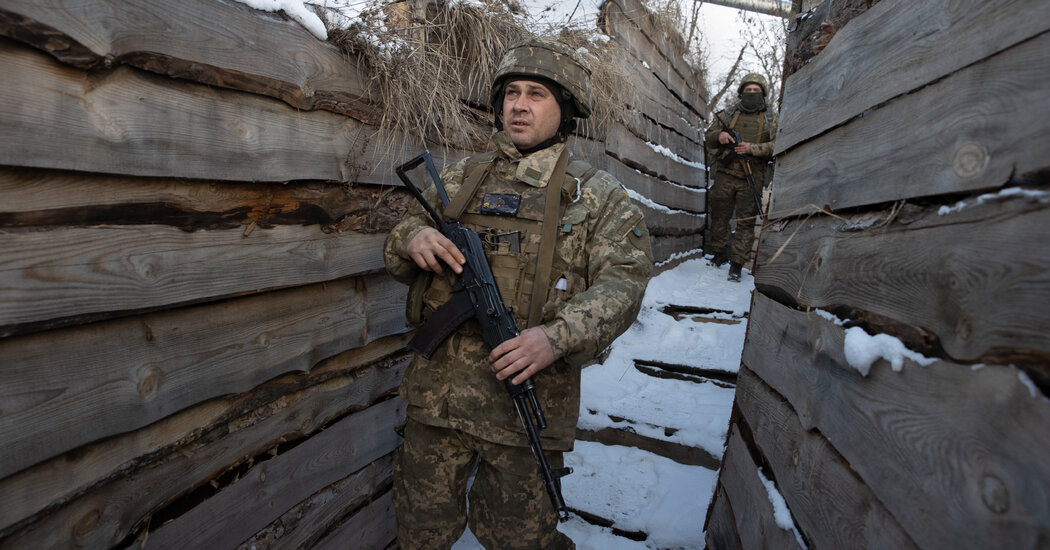
KYIV, Ukraine — With the Pentagon warning of a continued Russian troop buildup and possible imminent invasion of Ukraine, the leader of that country cautioned on Friday against talk of war, even as a diplomatic scramble to ease the standoff continued with no signs of a breakthrough.
President Volodymyr Zelensky of Ukraine said that the security situation surrounding his country — where intelligence officials estimate that 130,000 Russian troops have amassed near the borders, including north of the capital, Kyiv — was not much different than at this time last year, and, while dangerous, did not necessarily mean that war was imminent or unavoidable.
A day after speaking by phone with President Biden, who reaffirmed the United States’ commitment to respond forcefully to a Russian attack, Mr. Zelensky emphasized at a news conference that he and the American president did not disagree on seriousness the Russian threat, but differed on the tone of their public comments on it.
He noted that in the past, Russia has used military buildups as a scare tactic.
“We don’t have any misunderstanding with the president, but I just deeply understand what is going on in my country, just as he understands what is going on in his country,” Mr. Zelensky said of Mr. Biden. The drumbeats of war, he added, could contribute to domestic instability and economic troubles that would heighten the risk posed by Russia.
Mr. Zelensky took issue with decisions by the United States and Britain to withdraw nonessential diplomatic staff from Ukraine, which he suggested set an unduly alarming tone. “I think it was a mistake,” he said, adding that “under these circumstances, everyone is essential.”
“I don’t think we have the Titanic here,” he said.
The United States has been more outspoken than many European nations about the threat of a Russian attack, even as the Biden administration has tried to project a unified front with NATO allies.
The Pentagon said that in the past 24 hours, more Russian forces were being moved into the region. Although American officials do not believe that President Vladimir V. Putin of Russia has decided to launch an invasion, President Biden still believes there is “a distinct possibility” that Russia could do so in February, Emily Horne, spokeswoman for the National Security Council, said on Thursday.
It was that kind of time frame that Mr. Zelensky pushed back against the hardest.
“We have to be very careful in how we speak out every day, every minute, when we are trying to say the war will happen tomorrow,” Mr. Zelensky said. “We are getting ready for any scenario and we have several,” he said.
“I think it has to be quiet military preparation and quiet diplomacy,” he added.
“It is not as if we are acting like it is the highest level of threat,” he said. The simple fact that tens of thousands of Russian troops were on the border was itself a risk, with the danger of a mistake or a provocation spiraling out of control.
As Ukrainian soldiers dug into trenches along the snow-covered eastern front, children were out sledding in Kyiv, the capital. Most people went about their daily lives.
President Emmanuel Macron of France spoke by videoconference on Friday with Mr. Putin, and despite Mr. Macron’s advocacy of a somewhat conciliatory approach toward Moscow, the Kremlin said in a statement afterward that “the principal concerns of Russia went unaddressed.”
Still, Russia’s foreign minister, Sergey V. Lavrov, signaled that there could be a window for negotiation with the United States on limited security issues in Europe, including missile deployments and military exercises. Speaking in a Russian radio interview on Friday, Mr. Lavrov said that Washington’s written response this week to Russia’s demands for security guarantees contained “a kernel of rationality” on some matters.
Asked what he thinks about Mr. Putin’s intentions, Mr. Zelensky said that the actions of the Russians spoke for themselves.
“Why do you need so many soldiers? Why do you need so many drills so often?” he asked. “This is indeed dangerous.”
Russian actions are a form of “sadomasochism,” he said. “It is just blunt cynicism.”
Russia has demanded a drawdown of NATO forces from Eastern Europe, allowing Moscow to reassert a sphere of influence resembling the one it had until the 1990s. That is a nonstarter for the United States and its Western allies.
Western officials say that Russia’s public statements, often contradictory, do not square with the actions it has taken to menace Ukraine.
The United States and NATO allies have placed troops on high alert and stepped up weapons shipments to Ukraine, but Mr. Biden, who has not spoken to Mr. Putin since a tense “virtual summit” in early December, has said he does plan to send more U.S. troops to Ukraine.
The Biden administration has called a meeting of the United Nations Security Council on Monday, which could make for a face-to-face debate on Ukraine between the United States and Russia.





